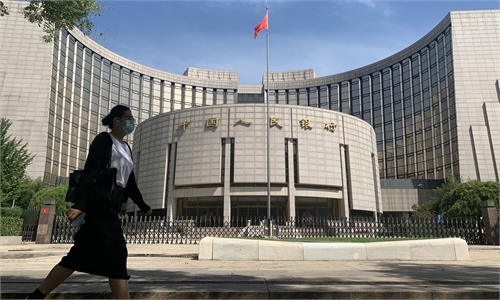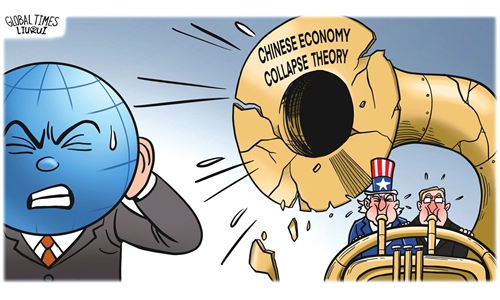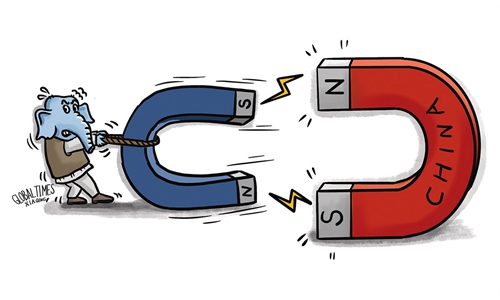Share This
Friday, January 26, 2024
Surprising Health Benefits Of Clapping - Clapping Hands Can Change Your Life
 Rightways - Sowing the seeds of Success:
Think Global, Act Local; Change & Grow Rich; Sow as You Reap & Soar High!
Richard Tan
MBA(UK), BCA(NZ), AMA(USA),MMIM
Rightways - Sowing the seeds of Success:
Think Global, Act Local; Change & Grow Rich; Sow as You Reap & Soar High!
Richard Tan
MBA(UK), BCA(NZ), AMA(USA),MMIM
Thursday, January 25, 2024
Western media’s coverage of China’s economy is inaccurate, biased
Confidence in the stock market will boost and support overall confidence in the Chinese economy
Bearing the impact of the three-year COVID pandemic, the Chinese economy still faced lingering side-effects of it in 2023, with the pandemic's scarring effect severely weakened market confidence. During the meeting of the Political Bureau of the Communist Party of China (CPC) Central Committee held in late July last year, the policymakers emphasized that the country's economic recovery was undergoing "wave-like" development.
Looking back, the market's expectations at the end of 2022 were overly optimistic. China set a GDP growth target of about 5 percent in early 2023, which was a more rational and reasonable approach. The Chinese economy successfully surpassed that target.
China's GDP growth rate has continued to increase despite the global economic downturn. While the global economy is expected to experience a slowdown last year to 3.0 growth, compared with 3.5 percent in 2022, China's growth rate increased from 3 percent in 2022 to 5.2 percent in 2023. This was a remarkable achievement that required overcoming external pressures and internal challenges.
China's economic growth rate remains relatively higher than other countries like the US. And, China is not the only country facing a slowdown in growth - lower than pre-pandemic levels.
Despite the global economic slump, China is still able to achieve a moderate to high growth rate of about 5 percent, which plays an important role in stabilizing the global economy. China's contribution to global economic growth last year was still about 30 percent, demonstrating that China remains an important driving force of the global growth.
China has aimed to actively cultivate new growth drivers through technological innovation, green development and data-enabled transformation. Despite the overall decline in exports last year, exports of the "New Three Items" grew rapidly, exceeding the 1 trillion yuan ($140 billion) mark.
China has achieved similar growth in other fields. From an industrial perspective, the value-added growth rate of high-tech industries is eye-catching. From an investment perspective, the investment growth rate in the high-tech manufacturing and services industries was higher than that in fixed-asset investment. Additionally, China has achieved international competitive advantages in many industrial fields, such as in green and renewable energies.
In 2024, the Chinese economy will benefit from several favorable conditions. First, with the further weakening of the pandemic impacts, China can expect economic and social activities to return to a normal level. This will stimulate continued growth in consumption and investment, and contribute to expanding the scale of the economy.
Second, the implementation of fiscal and monetary stimulus policies will continue to provide the necessary support for stabilizing economic growth and promoting the recovery. The Central Economic Work Conference made it clear that macroeconomic regulation will be intensified.
Third, China's plan to implement reform and opening-up measures in key areas will inject new vitality into economic growth. Technological innovation and the next industrial revolution will become new driving forces for economic development.
If China follows the deployment of decisions by the Central Economic Work Conference, promotes high-quality development and intensifies structural adjustments while maintaining necessary policy support, there will be positive momentum for the economic recovery.
However, China should also recognize that the complexity, severity and uncertainty of the external environment in 2024 still exist. From a positive perspective, the US Federal Reserve's interest rate hikes are nearing an end and there is the possibility of rate cuts, which will expand the space for China's macroeconomic policies and encourage European and US companies to replenish their inventories, improving overseas demand for Chinese goods.
In addition, ongoing high-level exchanges and dialogue between China and the US will help control their tensions.
However, China should be aware of the economic uncertainties, especially in the late stage of the US Federal Reserve's tightening cycle. Insufficient tightening may lead to the Fed reconsidering rate hikes, while excessive tightening may cause a hard landing for the US economy.
According to the World Trade Organization's forecast in October 2023, global merchandise trade growth may recover from 0.8 percent in 2023 to more than 3 percent in 2024. Therefore, China expects its foreign trade exports will likely recover and grow in 2024.
China experienced fluctuations in foreign enterprises' investment in 2023. However, fluctuations in foreign investment are normal, not only in China but also in other countries, including the US.
Since total global foreign direct investment fell from 2020 to 2022, while China's attractiveness to foreign investment continued to steadily increase, it was not surprising to see some adjustments in scale in 2023.
In addition, the impact of non-economic factors in reshaping global industrial and supply chains may have some influence on China's utilization of foreign investment.
China is still a growing economy with a colossal market, so it still has an appeal to foreign investment. With the normalization of communication and exchanges with the outside world, investors are paying more and more attention to China's market, and confidence in China's economic fundamentals keeps on recovering.
By Guan Tao
The author is global chief economist at BOC International under Bank of China. bizopinion@globaltimes.com.cn
 Chinese authorities vow stronger measures to bolster stock market, with sufficient policies in toolkit
Chinese authorities vow stronger measures to bolster stock market, with sufficient policies in toolkitChina's benchmark Shanghai Composite Index posted a V-shaped rebound on Wednesday after the securities regulator vowed to strengthen investor protection and oversight of listed companies. Analysts said that Chinese authorities have the confidence and resolve to maintain the healthy and steady development of the country's financial sector, with sufficient policies ...
Chinese policymakers on Wednesday issued a package of major policies to boost the country's economy, including cutting the amount of cash that banks are required to hold as reserves to inject nearly $140 billion into the economy and lowering refinancing and rediscount rates, signaling that China is stepping up efforts to ensure stable economic recovery in 2024.
 Rightways - Sowing the seeds of Success:
Think Global, Act Local; Change & Grow Rich; Sow as You Reap & Soar High!
Richard Tan
MBA(UK), BCA(NZ), AMA(USA),MMIM
Rightways - Sowing the seeds of Success:
Think Global, Act Local; Change & Grow Rich; Sow as You Reap & Soar High!
Richard Tan
MBA(UK), BCA(NZ), AMA(USA),MMIM
Monday, January 22, 2024
China’s contribution to the global economy
Growth engine: An employee works on steel castings in a factory in Hangzhou, China. The country’s contribution to worldwide economic growth is approximately 30%. — AFP
The country has evolved from a regional power to a global economic leader, making significant contributions to international affairs and economic development.
Through active participation in international organisations, development of extensive trade networks and investments in global infrastructure projects, China exerts a profound impact on the world economic system.
At the World Economic Forum in Davos, Chinese Premier Li Qiang articulated the key aspects of China’s economic policy and strategy.
He noted that China demonstrates sustained progress in economic development and exerts a significant influence on the global economy, serving as a vital engine of global development.
China’s contribution to global economic growth is approximately 30%, underscoring its central role in the world economic system. Li also highlighted that China achieved an economic revival with an expected gross domestic product growth of 5.2% in 2023, surpassing the initial target of 5%.
Furthermore, Li pointed out that China is the only country covering all industrial sectors classified by the United Nations, and its added value in industry accounts for about 30% of the global level.
This testifies to China’s leading position in the global industry and its ability to stimulate worldwide productivity.
China’s active participation in international organisations underscores its commitment to multilateral cooperation and global responsibility.
The recent reelection of China to the United Nations Human Rights Council for the 2024-2026 term at the 78th session of the UN General Assembly marks a significant milestone, affirming its influence and commitments in international affairs.
This is the sixth time China has been a member of this crucial body, demonstrating its active role in advancing global dialogue and cooperation in the field of human rights.
Furthermore, the Belt and Road Initiative, which celebrated its 10th anniversary in 2023, stands as one of China’s most ambitious projects in global economic development.
The third forum of international cooperation under this initiative achieved 458 significant outcomes.
Chinese financial institutions allocated 780 billion yuan to finance projects associated with the initiative, facilitating the creation of close economic ties with numerous countries.
Chinese and foreign enterprises reached business cooperation agreements worth US$97.2bil, emphasising China’s role as a global economic partner and a bridge between various world regions.
China’s transportation infrastructure plays a critical role in its economic dominance. The country has established air connections with over 100 countries and regions worldwide, fostering stronger global connections and increasing trade.
The total tonnage of the fleet owned by Chinese shipowners amounts to 249.2 million gross tonnes, reflecting the scale of its maritime power.
These achievements, combined with leadership in cargo and container throughput at ports, underscore China’s strategic role in global logistics and trade.
China’s industry also exerts a significant influence on the global economy.
The country leads in many sectors, maintaining the world’s top position in industrial added value for the past 14 years.
This achievement is particularly notable given that China is the only country covering all industrial sectors classified by the United Nations.
With over 200 major industrial clusters, China boasts a large and diverse industrial system that contributes to the global distribution of production factors and enhances worldwide productivity.
The China-initiated South-South Cooperation Assistance Fund, with a capital of US$4bil, serves as a key tool in supporting international development and strengthening global partnerships.
Additionally, Chinese financial institutions are preparing to launch a special fund of US$10bil aimed at implementing initiatives for global development, highlighting China’s strategic role in worldwide economic progress.
Evidence of China’s growing economic power is also seen in the significant increase in foreign investments.
From January to September 2023, 41,947 enterprises with foreign investments were established in China, representing a 32.1% increase compared to the previous year.
This reflects the attractiveness of the Chinese market to international investors and its ability to draw capital from various corners of the world.
In conclusion, China’s contribution to the global economy is multifaceted and substantial. From active participation in international organiaations and global initiatives, to leadership in the industrial and financial sectors, China demonstrates its role as a global economic leader.
Social and humanitarian efforts, along with contributions to peacekeeping missions, further underscore its commitment to cooperation and sustainable development.
The reflections of these achievements in the speeches of leaders like Li Qiang underscore China’s strategic vision and contribution to shaping the future of the global economy. — China Daily/ANN
By Azerbaijan-based journalist Seymur Mammadov is a special commentator for China Daily. The views expressed here are the writer’s own.
 Rightways - Sowing the seeds of Success:
Think Global, Act Local; Change & Grow Rich; Sow as You Reap & Soar High!
Richard Tan
MBA(UK), BCA(NZ), AMA(USA),MMIM
Rightways - Sowing the seeds of Success:
Think Global, Act Local; Change & Grow Rich; Sow as You Reap & Soar High!
Richard Tan
MBA(UK), BCA(NZ), AMA(USA),MMIM
Sunday, January 21, 2024
How Malaysians can learn to love AI
How Malaysians can learn to love AI
We had the launch of the Central Database Hub, or Padu, on Jan 2 and just this week, on Tuesday, the AI for the Rakyat portal, was unveiled.
AI untuk Rakyat
AI For Rakyat
, https://ai.gov.my/#/homeThe introduction at its website, ai.gov.my, is interesting: “AI untuk Rakyat” is a self-learning online programme designed to raise public awareness about artificial intelligence (AI).
“It aims to demystify AI for people from all walks of life – a student, a stay-at-home parent, a professional in any field, a senior citizen – basically, anyone interested in getting acquainted with it and wanting to build a ‘Digital First Mindset’.”
If all goes well, the portal could indeed help to address the country’s growing digital divide as those with access to the digital world pull away from those who don’t have the means to benefit from it.
Padu is entirely designed and maintained by the government to ease fears of our data being misused in the hands of a third party.
Similarly, AI for the rakyat is largely government-driven, with the Economy Ministry working with just one private company, Intel.
And we are glad to note that apart from Bahasa Malaysia, the portal is also inclusively available in English, Chinese and Tamil (the last is rare indeed).
The government is hoping to have one million Malaysians become familiar with AI skills in three years.
That’s all well and good, but we must ensure that this portal does not go the way of previous tech initiatives, like the Multimedia Super Corridor, which did not reach its full potential.
All these digital initiatives need real support in the form of nurturing ecosystems and infrastructure, serious investment, and an open acceptance of all sorts of different talents.
Most importantly, “knowing” AI does not lessen the urgent need for solid cybersecurity laws and a moral code of ethics to govern the use and development of all digital initiatives, including AI.
As Economy Minister Rafizi Ramli stressed at the portal’s launch, there must be optimal end-to-end conditions and wholesome policies to accompany the growth of AI.
Rafizi argued that without trustworthy data and secure channels, the products and services driven by AI technology could not be implemented properly.
“To be the regional and global AI hub, we must be able to create new uses for AI. This can only be done if we have ready and accessible data,” he said, pointing out that Padu is a step towards this.


What is AI untuk Rakyat?
Who is this program for? Who should/ can attend/ participate in it?
What is the duration of this program?
What is covered in the program?
What are the prerequisites for this program?
What will I get once I complete the program?
Can I call myself an AI expert after attending this program?
I have finished the program. What is the next step?
I am unable to select my birth year on the registration page. What should I do?
I did not receive the OTP. What do I do?
My query is not resolved yet - whom should I reach out to?
 Rightways - Sowing the seeds of Success:
Think Global, Act Local; Change & Grow Rich; Sow as You Reap & Soar High!
Richard Tan
MBA(UK), BCA(NZ), AMA(USA),MMIM
Rightways - Sowing the seeds of Success:
Think Global, Act Local; Change & Grow Rich; Sow as You Reap & Soar High!
Richard Tan
MBA(UK), BCA(NZ), AMA(USA),MMIM
Thursday, January 18, 2024
China achieves 5.2% GDP growth in 2023, is an encouragement for global economic recovery
Graphic: Global Times
China posted a GDP growth of 5.2 percent for 2023 on Wednesday, successfully meeting last year's annual target and in line with market forecast.
The world's second-largest economy is now at 126 trillion yuan ($17.67 trillion) and an official with the National Bureau of Statistics (NBS) projected that China was the world's largest growth engine for the past year.
In the fourth quarter of 2023, China's GDP expanded 5.2 percent.
The NBS data came after Chinese Premier Li Qiang made a revelation of the 5.2-percent GDP growth for 2023 during a speech at the World Economic Forum annual meeting in Davos on Tuesday.
At Davos, Li called for global cooperation in various areas to rebuild global trust, including strengthening macroeconomic policy coordination and international industrial specialization and cooperation, warning that lack of trust and fragmentation will risk global economic growth and peaceful development.
Chinese analysts said the GDP reading showed that China's economy has achieved a remarkably steady growth and emerged from the shadows of the pandemic over the past 12 months, despite factors including a slowdown in the real estate industry.
Standout achievements include vibrant services sector spending, substantial investments in high-end manufacturing, and notable progress in foreign trade activities. These compelling data refute the continuous attempts by certain foreign media outlets to paint a negative picture of China's economic recovery, they noted.
The data highlight the strong internal dynamics of the Chinese economy and its significant potential for continuous expansion, even amid a turbulent international macroeconomic environment, continuing to drive global resurgence, said analysts.
"Facing complex international environment and arduous tasks of domestic reform and development in 2023, the Chinese economy witnessed the momentum of recovery, supply and demand improved, transformation and upgrades advanced solidly … And major expected targets were achieved," Kang Yi, head of NBS, told a State Council Information Office press conference on Wednesday.
China's 5.2-percent growth in 2023 far exceeded an estimated average of 3-percent growth of the world economy. Contribution of the Chinese economy to the world economy is expected to exceed 30 percent with China becoming the largest growth engine of global growth, Kang said, noting that the increase of China's GDP in 2023, at more than 6 trillion yuan, equals to the whole year GDP of a medium-sized country.
Specifically, whole-year value-added of the industrial enterprises above designated size went up 4.6 percent year-on-year, retail sales of consumer goods were up 7.2 percent, and fixed-asset investment edged up by 3.0 percent.
Looking ahead, the NBS chief said, "we must be aware that the external environment is increasingly complex, severe and uncertain, and the economic growth is still facing difficulties and challenges."
Analysts interviewed by the Global Times said the government will need to tackle a number of issues including ultra-low inflation and a weak property sector in 2024, while calling for the rolling out of more pro-growth stimulus.
Cao Heping, an economist at Peking University, told the Global Times on Wednesday that the fact that the Chinese economy can achieve a 5.2-percent growth rate under the severe conditions last year is a proof that the Chinese economy has firmly set its foot on the track of new economy, which is powered by digital technologies.
Zhou Maohua, a macroeconomic analyst at Everbright Bank, told the Global Times on Wednesday that there are certain fluctuations in the recovery trajectory in 2023, suggesting uneven recovery. "More efforts are needed to restore the full vigor of the economy."
China's recovering industrial sector faces uncertainty of overseas demand, spillover effects of geopolitical conflicts and the reshaping of global industrial and supply chain, Zhou noted.
Hu Qimu, deputy secretary-general of the digital-real economies integration Forum 50, told the Global Times on Wednesday that the government needs to spend more efforts to bolster up prices of goods, as a continued softening of consumer prices will hurt expectations.
NBS' Kang responded to a media question at the conference, saying the streak of Consumer Price Index declines seen in recent months is mainly driven by structural and periodical factors, noting the CPI in 2024 is expected to rebound mildly.
Positive factors
NBS' Kang said the Chinese economy is expected to continue on a recovery track and faces more opportunities than challenges in 2024 as factors supporting the high-quality development of the Chinese economy are converging. Recently, international organizations including the IMF and the OECD have revised China's growth projections in 2024.
Experts pointed out that the Chinese economy has demonstrated remarkable resilience in 2023 and they noted that the Chinese economy will continue to forge ahead in 2024 despite global challenges as China has room to intensify policies aimed at driving economic growth.
Xing Zhaopeng, senior China strategist with ANZ Research, said China is expected to set a GDP growth target of 5 percent for 2024 and "potential growth should still be above 5 percent."
"We expect China will roll out strong measures to guide the green consumption and investment, to help offload the excess supplies in the economy," Xing told the Global Times on Wednesday.
Yu Yongding, academic advisor to the CF40 and Member of the Chinese Academy of Social Sciences, also said in a recent signed article that "In my opinion, the economic growth target for China in 2024 should not be lower than 5 percent."
"In 2024, we expect China's economy to grow by around 5 percent, which would be very impressive," Li Daokui, director of Tsinghua University's Academic Center for Chinese Economic Practice and Thinking (ACCEPT), said at a recent forum.
"On the positive side, consumption of goods will continue to expand as the lingering effect of the pandemic fades further away in 2024 and employment and resident income continue to improve, resulting in further lifting up of consumer confidence," Zhou said. "The property market is set to stabilize with the implementation of the government's supportive policies, and this will bring recoveries to related industries."
As the new year begins, efforts are being made to achieve a robust economic start all over the country.
Thousands of key projects saw construction begin in a number of localities including East China's Jiangsu Province, South China' Guangdong Province, Shanghai, Northwest China's Shaanxi Province, focusing in the field of new economy, high-end manufacturing, infrastructure and urban improvement, the Economic Daily reported on Monday.
According to a report from the Chinese Academy of Sciences Center for Forecasting Science, China's economy will maintain a stable growth in 2024, with forecasted GDP growth hitting 5.3 percent.
China's 5.2% growth encouragement for global economic recovery: Global Times editorial
China's National Bureau of Statistics on Wednesday released a series of key data on China's economy for the year 2023. Among them, the most attention-grabbing is the year-on-year GDP growth of 5.2 percent, which is higher than the expected target set at the beginning of last year. Once again, the actual trajectory of China's economy stands out from some external pessimistic views, criticisms, and even collapse theories, demonstrating robust resilience and potential. According to estimates based on the World Bank's predictions for growth rates of major economies in 2023, China's economic increment is approximately 1.5 times that of the US and around 16.5 times that of the Eurozone. China's contribution to global economic growth is greater than the combined contributions of the Americas, Europe, and Japan, making it a leading engine for global economic growth.
From the reports and commentaries of various domestic and international media, it is evident that this figure is generally in line with, or even exceeds, market expectations. To be frank, the Chinese economy's recovery in 2023 was not entirely smooth. The impact of the pandemic's "scar effect" on the economy was larger than anticipated, with the real estate sector persistently sluggish. Simultaneously, the weak global economic recovery exerted pressure on trade growth, and the spillover effects of actions such as the Federal Reserve's interest rate hikes and the appreciation of the US dollar shouldn't be underestimated. The public, to varying degrees, have experienced the impacts of these domestic and external challenges in their micro-level perceptions over the past year.
There were once even voices of "deflation" in public opinion, and opportunistic individuals outside even seized the opportunity to chant the "collapse of the Chinese economy." Achieving such results in this context is undoubtedly of positive significance. It not only plays a constructive role in allowing both domestic and international observers to gain a timely and clear understanding of the overall picture of the Chinese economy but also serves as the best refutation of the various unfounded theories and speculations about the Chinese economy. Furthermore, it provides a strong encouragement amid the generally lower expectations for global economic recovery this year.
In fact, based on various data released by the National Bureau of Statistics, it is evident that China's economy underwent an accelerated transformation last year. First, the traditional "three engines" that drive the economy - exports, consumption, and investment - are undergoing significant changes in their contribution to economic growth. In 2023, the contribution rate of domestic demand, represented by consumption and investment, to economic growth reached 111.4 percent, an increase of 25.3 percentage points on the previous 12 months. However, there is also a problem of insufficient effective demand, and the combination of supply-side structural reform and expanding effective demand needs further strengthening.
Second, the structural adjustment and transformation and upgrading of economic development have been accelerating. In 2023, more than 1 trillion yuan ($140 billion) worth of "new three items," namely electric vehicles, solar panels, and lithium batteries, have been exported, with investments in high-tech manufacturing and high-tech services growing by 9.9 percent and 11.4 percent respectively. However, we have also seen that the potential of high-tech industries to drive the national economy has not been fully realized yet.
It should be said that it is precisely in the complex and diverse process of China's economic changes that various observations and feelings have been formed. However, for a super-large-scale economy like China, and a big ship like the Chinese economy, the most important thing is to determine if it is sailing in the right direction. In the process of the aforementioned economic development, we have already witnessed the strong potential of moving toward high-quality development. This is why the 5.2 percent figure represents the confidence that the Chinese economy can navigate the challenges this year. Now, the key is to release this potential with sufficient patience and redoubled efforts, and smoothly achieve the transformation and upgrading of the economic structure.
It can be foreseen that 2024 will also not be a smooth journey, as competition among various forces will intensify. However, what's certain is that in the context of the global economic growth expected to slow down, the continuous rise of geopolitical risks, the onset of a super innovation cycle, and the acceleration of global green transformation, China's overall macroeconomic and policy direction is the clearest and most stable among all major economies. We will seek new growth driving factors through tech innovation, transformation and upgrading, continuously increasing investment in areas such as digital economy, artificial intelligence development, and green technology, while continuing to exert the policy effects of stabilizing growth. The resilient Chinese economy will provide the world with certainty and stability.
China's economy ended 2023 on a positive note, recording a year-on-year GDP growth of 5.2 percent and surpassing the set targe
The 5.2 percent growth figure for China's economy in 2023 is a strong number, given the size of the Chinese economy, its state of development and the weak outlook for global growth. I sharply disagree with critics who say the Chinese economy is stumbling.
China's consumption in 2023 played a vital role in bolstering economic development. Final consumption contributed 82.5 percent of overall GDP growth, while retail sales set a new record of 47.15 trillion yuan ($6.62 trillion), data from the National Bureau of Statistics (NBS) showed on Wednesday.
China should set an economic growth target of 5 percent or above for 2024, as the global economy is projected to slow this year.
China's National Bureau of Statistics is due to release the country's GDP data for 2023 on Wednesday. While ...
Rajesh Kumar Singh, secretary at the Department for Promotion of Industry and Internal Trade, told Reuters in an interview that India could "ease its heightened scrutiny of Chinese investments" if the two countries' border "remains peaceful," which was ...
GDP expands 5.2% last year despite headwinds - The Star
Asia’s Top Economist Reveals Shocking SECRET About China In 2024
 Rightways - Sowing the seeds of Success:
Think Global, Act Local; Change & Grow Rich; Sow as You Reap & Soar High!
Richard Tan
MBA(UK), BCA(NZ), AMA(USA),MMIM
Rightways - Sowing the seeds of Success:
Think Global, Act Local; Change & Grow Rich; Sow as You Reap & Soar High!
Richard Tan
MBA(UK), BCA(NZ), AMA(USA),MMIM

















